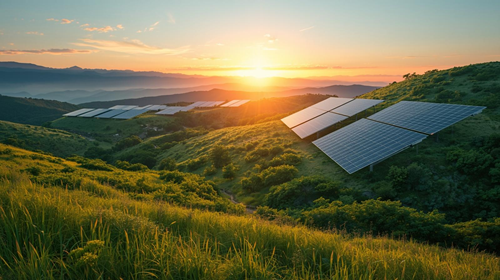Not only in the USA, but also in other countries, criticism has recently been voiced about the rapid transition of energy supply to renewable electricity sources. It is said to be economically unsustainable. Nothing could be further from the truth. The global trend towards wind, solar, hydro and biomass is unstoppable – and necessary. “Those who slow down here will lose touch“, comments Patrick Lemcke-Braselmann, Co-CEO of the aream Group. However, he adds that much remains to be done to increase the efficiency of the system.
The facts speak for themselves: electricity generation from wind, solar, hydro and biomass is on the rise worldwide – and for many reasons, this trend is irreversible. Firstly, because of climate change: around 70 per cent of global CO₂ emissions are caused by the use of fossil fuels. The effects of climate change, with extreme weather, droughts and floods, are becoming increasingly noticeable and are causing immense costs. Decarbonising electricity production is considered the most important lever for combating global warming.
At the same time, the green transition makes economic sense. ”Contrary to what is often claimed, renewable technologies are already the cheapest way to create new electricity capacity – in almost all countries worldwide”, says Lemcke-Braselmann. According to the International Energy Agency (IEA), photovoltaics and wind power are becoming established on a sustainable basis thanks to dramatically reduced costs and technologies that are ready for series production. But the economic rationale for renewables goes beyond cost advantages: investments create new jobs, promote local value creation, strengthen rural areas and open up new development opportunities.
The climate policies of numerous countries and favourable costs are fuelling a new wave of demand. More and more private households, businesses and local authorities are turning to their own or regional green electricity. In 2025, the share of renewables in the global electricity mix broke through the 34 per cent mark for the first time, with more electricity being generated from green sources than from coal for the first time.
It is therefore no surprise that expansion is progressing rapidly: worldwide capacity is growing by around 300 gigawatts annually, with solar energy accounting for around 80 per cent of the increase. China, the European Union and India in particular are steadily driving this development forward. Forecasts are regularly exceeded by reality – especially in the photovoltaic sector. Economies of scale make renewable energy plants cheaper, more efficient and more resilient. ”Industrial mass production acts as a catalyst here”, says Lemcke-Braselmann, ”it is the game changer.”
However, as the share of renewable energies increases, so do the demands on the flexibility of the electricity system. According to the IEA and industry experts, the electricity market is more volatile than ever before because renewable energy sources sometimes produce peaks that lead to low or even negative prices at times. The number of hours with negative electricity prices in the major European markets recently reached eight per cent – a significant increase compared to previous years. ”The solution is obvious”, says Lemcke-Braselmann: expansion of modern grids, digitalisation, battery storage and flexible consumers. California, for example, already temporarily stores a quarter of its solar power generation in batteries. ”Flexibility is the new gold”, explains Lemcke-Braselmann.
In addition to increasing the share of renewable energies in electricity generation, further steps are therefore needed, such as the expansion of large and small battery storage facilities, the flexibilisation of electricity consumption and generation, the electrification of heating, mobility and industry, rapid digitalisation of the grid infrastructure, and comprehensive debureaucratisation and reform of grid operation. ”The challenges of integration can be solved”, says Lemcke-Braselmann. “The advantages for people, the economy and the environment outweigh the disadvantages.“
PRESSEKONTAKT:
Leandra Kiebach
T: +49 (0)211 30 20 60 4-2
E: lk@aream.de
